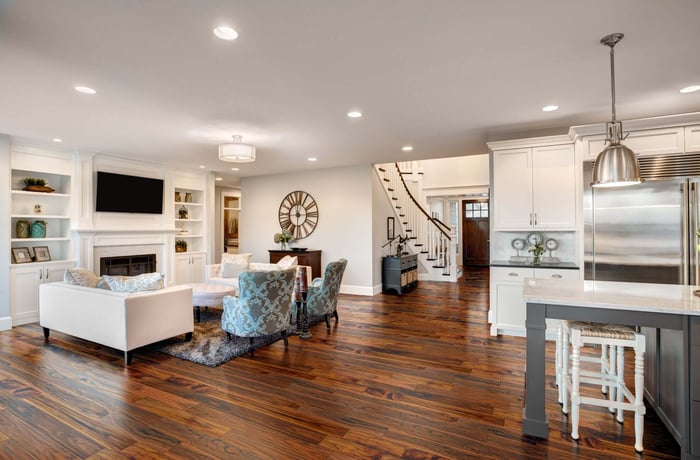Hardwood flooring has a long-standing reputation as a solid choice for property owners around the country. A hardwood floor gives your property a sense of traditional class and beauty. Property owners who decide they want this kind of flooring often find themselves in the middle of a debate: engineered hardwood vs. solid hardwood.
Both engineered and solid hardwood flooring comes with pros and cons. You can review the benefits of both types of flooring and learn more about engineered hardwood floors by Harper Floors by calling our team at 888-807-2704 or get free samples of any of our flooring materials on our website.
Basic Information About Engineered and Solid Hardwood Flooring
Before we dig too deeply into the comparison between engineered and solid hardwood flooring, we need to define what we’re discussing.
Solid Hardwood Floors
Hardwood floors are very durable and last a long time, making them an appealing option for many property owners. Flooring companies make solid hardwood flooring from wood, including oak, acacia, kempas, Brazilian teak, and Brazilian walnut options. Milling companies cut and finish the wood, creating planks.
Engineered Hardwood Floors
Engineered hardwood floors look like solid hardwood flooring but feature a real wood veneer over an engineered core of plywood, cork, or other soft material that improves flexibility and resistance to fluctuations in humidity and temperature. Engineered hardwood floors can withstand a bit more abuse in a busy household than traditional hardwood floors. Additionally, engineered hardwood floors can withstand exposure to moisture and temperature fluctuations that otherwise would cause contraction and expansion.
Engineered vs. Solid Hardwood: Installation
You need a different installation method for both engineered and solid hardwood.
Solid Hardwood
Installation crews must nail each hardwood plank into place when installing a traditional solid hardwood floor. This process requires skill and training to complete correctly, and it can take a significant amount of time.
Your home likely already has a solid material subfloor like concrete or plywood. Depending on the subfloor material such as plywood, the work crew will install a flexible underlayment of 15lb black felt paper over the subfloor before laying down the tongue-and-groove hardwood planks. Once snapped in place, your installers can nail the planks in place.
Engineered Hardwood
Installing engineered hardwood requires crews to click planks together or glue them into place. In many cases, property owners can complete the installation process independently, allowing them to save on installation costs.
Engineered hardwood also requires solid material subfloors and a underlayment. Professional installers (or the homeowner and some buddies) can lay down the engineered hardwood, snap the tongue-and-groove planks in place, and secure the planks with glue, a nail gun, or staples depending on the product being installed. Be aware, nailing or stapling your flooring requires a plywood subfloor to secure the materials.

Engineered vs. Solid Hardwood: Size
Solid and engineered hardwood floor planks are generally different sizes. Depending upon the available space in your property, this could influence your final purchase choice when buying hardwood flooring.
Solid Hardwood
Solid hardwood planks generally average about 3/4” in thickness. Many suppliers offer widths between 3 1/4” and 4 3/4”. Depending on the width, your solid hardwood planks may be available in lengths between 34.65” and 47.6”.
Engineered Hardwood
The sizes of engineered hardwood planks vary. You may want to speak with a professional about the best sizes to use in your home. Expert installers can help you find the best option to address all your needs.
Engineered vs. Solid Hardwood: Lifespan
Both engineered and solid hardwood floors can last a long time.
Solid Hardwood
Solid hardwood floors generally last for decades, with some lasting for more than 100 years. As the surface of the floor begins to show signs of wear and tear, property owners can refinish it. Refinishing solid hardwood involves sanding away the top layer of the floor, effectively starting over with a blank slate. Then oil or varnish treatments can be applied for a brilliant shine and resistance to new damage.
Engineered Hardwood
Engineered hardwood floors can be refinished occasionally to improve appearance and improve resistance to new damage from furniture, sun exposure, or heavy traffic. Some engineered hardwoods offer thicker wood veneers to extend the life of your flooring and increase the number of times you can refinish your floors.
Engineered vs. Solid Hardwood: Maintenance Needs
Both types of hardwood floors require regular care and maintenance to stay in good condition throughout their lifespan.
Solid Hardwood
Many property owners find it easy to clean solid hardwood floors. You need to sweep and vacuum the floor regularly to keep them clear of dirt and dust. You may use a dry mop – or a mop with an approved hardwood cleaner – to remove stains.
Keep in mind that high moisture levels can damage hardwood floors. Therefore, you should not use a wet mop to clean the floor or allow spills to remain on the wood.
Engineered Hardwood
Engineered hardwood floors would ideally have the same care routine as solid hardwood. The flexible core allows for some additional abuse with fewer negative effects than natural solid hardwood, including occasional use by a swiffer to remove any messes that could be particularly sticky or possibly stain your floors. You should still dry any wet areas immediately for the best care practices.

Engineered vs. Solid Hardwood: Cost
You can expect significant cost variations between engineered hardwood vs. solid hardwood flooring.
Solid Hardwood
Solid hardwood floors use real wood. In addition, most hardwood flooring uses expensive types of wood, like maple or walnut. You should expect relatively high price points for this flooring material.
Depending upon where you live and the kind of wood you want for your flooring, you could expect to pay around $8-$15 for each square foot of natural hardwood flooring at retail markup. Factory direct pricing online can save you a great deal in cost. Harper Floors offers an assortment of hardwood options affordably with true factory direct pricing.
Engineered Hardwood
Many people find engineered hardwood far more budget-friendly than solid hardwood. Retail prices range from $2.50 to $10 a square foot, making it less expensive than most traditional hardwood floors. Like real hardwood, engineered hardwood flooring may be procured much more affordably through a factory direct pricing supplier.
Engineered vs. Solid Hardwood: Environmental Concerns
Each piece of wood that goes into a hardwood floor requires proper care. These floors do not always handle environmental conditions in the same way.
Solid Hardwood
Traditional hardwood floors demonstrate a high level of sensitivity to moisture and humidity. Even if you never use a wet mop on your hardwood floor, the planks may warp, crack, or begin to rot if exposed to high amounts of humidity. Keep this in mind if you live in an area with humidity that regularly exceeds 60% or higher, and consider installing a dehumidifying system in your home.
Engineered Hardwood
Technically, engineered hardwood is not waterproof. However, it resists moisture and humidity's damaging effects better than solid flooring options.
Consider this factor if you live in an area with a lot of humidity or if you want to use engineered hardwood flooring in a wet area like a bathroom or kitchen.
Engineered Hardwood vs. Solid Hardwood: Added Value to Your Home
Many prospective home buyers show increased interest in homes with hardwood floors.
Solid Hardwood
Generally, solid hardwood flooring increases the value of your home in the real estate market. Your realtor may use hardwood flooring as a selling point, using it as an add-on to increase the selling price of your property by more than 2% in many cases.
Engineered Hardwood
In many cases, engineered hardwood looks like traditional hardwood flooring, making it appealing to potential buyers. It’s also a much more affordable option if you intend to sell your home within the next few years. If you intend to sell your home soon, choose the more affordable engineered hardwood flooring rather than making a large investment in solid hardwood.
Engineered vs. Solid Hardwood: Popular Brands
Several manufacturers work on hardwood floors. You can go over online reviews for different manufacturers to find one you feel comfortable using. In some cases, companies produce both solid hardwood floors and engineered hardwood options.
Manufacturers also provide different styles of hardwood floors. You may shop around to find a company that offers the aesthetic look you want before placing your final order.

Speak with Us to Discuss All Your Hardwood Floor Options
The hardwood flooring experts at Harper Floors are standing by to provide you with the answers you want. We have extensive experience with both solid and engineered hardwood flooring options. Order samples online from our fully stocked warehouses based out of El Monte, CA and Phillipsburg, NJ.
Want to learn more about engineered hardwood vs. solid hardwood? Contact Harper Floors toll-free at 888-807-2704.








